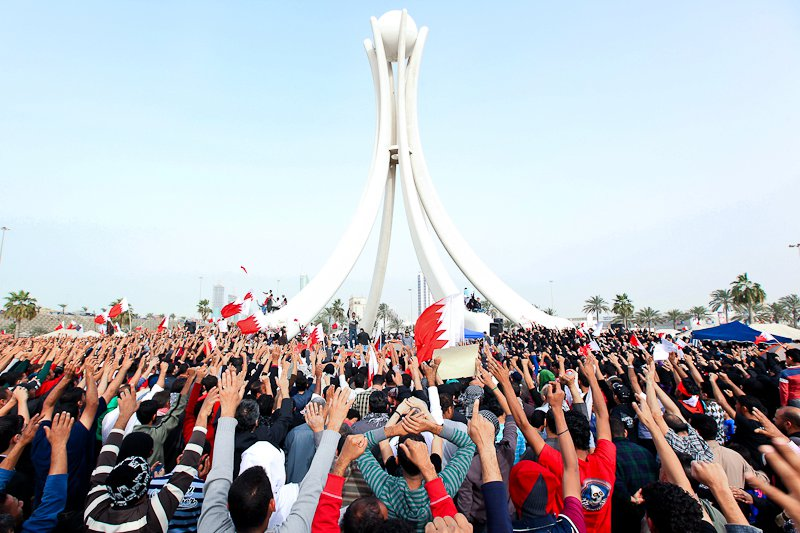
Protesters at Pearl roundabout, Manama, February 2011 (Source: Bahrain in pictures/Wikimedia Commons)

BAHRAIN
 Our Concerns
Our Concerns
- Ongoing crackdown on freedom of expression, peaceful assembly and association;
- Repression and systematic harassment of peaceful dissidents, political opponents and human right defenders;
- Persistent use of torture by the security forces, absence of independent investigations into allegations of torture and lack of accountability for perpetrators.
 Upcoming
Upcoming
- July 2018: Review of Bahrain by the Human Rights Committee.
In early 2017, the Bahraini authorities executed three men convicted of killing three police officers in a 2014 bomb attack. The executions were the first to be carried out in Bahrain since 2010. Human rights experts, including the UN Special Rapporteur on extrajudicial executions, expressed concern over reports that the men had been forced to confess under torture and were denied access to legal counsel.
Furthermore, tensions remained high as a result of the ongoing campaign of repression against political opponents. After the dissolution of the main opposition group Al Wefaq in 2016, the Bahraini authorities continued to further crackdown on political opposition. In March 2017, the Bahraini High Civil Court ordered the dissolution of the opposition group, the National Democratic Action Society (Waad), which was accused of “advocating violence, supporting terrorism and encouraging crimes”. This ruling followed a statement issued by Waad on the anniversary of the 2011 uprising, warning that Bahrain was suffering from a “constitutional political crisis”.
Moreover, in May 2017, Sheikh Isa Qassem, spiritual leader of Al Wefaq, was handed a one-year suspended prison sentence on trumped-up charges of illegal fundraising and money laundering for having performed khums, the traditional collection and distribution of charities to the community performed by Shia clerics. In 2016, he had his nationality revoked in retaliation for his criticism of the authorities. On May 23, 2017, Bahraini security forces conducted a security operation in the area of Al Diraz, where supporters of Sheikh Isa Qassem had been holding a sit-in since June 2016. The police opened fire on the protesters, triggering clashes that resulted in mass arrests and the death of five protesters. This operation, the most violent since 2011, received wide international criticism, and was denounced in a statement by the UN High Commissioner for Human Rights.

Prevailing impunity for acts of torture and ill-treatment
Torture continues to be systematically practised by law enforcement officials falling under the authority of the Ministry of Interior, and is used both during interrogation to extract incriminating confessions and in detention. The most frequent forms of torture and ill-treatment described by victims include beatings, electrocution, being suspended in painful positions, sleep deprivation, exposure to extreme temperatures and threats of violence against detainees and their families.
On May 12, 2017, the Committee against Torture published its Concluding Observations following the review of Bahrain’s compliance with its international obligations under the UN Convention against Torture. The UN experts expressed concern over the “continued, numerous and consistent allegations of widespread torture and ill-treatment of persons deprived of their liberty”, as torture is used “to extract confessions or as punishment.” The Committee also highlighted the discrepancy between the legal safeguards enshrined in Bahraini law and the regular disregard for these safeguards in practice.
Echoing the concerns expressed by Alkarama in its shadow report to the Committee, the UN experts criticised the climate of impunity in Bahrain for perpetrators of torture, considering that allegations are not properly investigated, as illustrated by the low number of convictions for acts of torture. The Committee found that the existing mechanisms for prosecuting the perpetrators of acts of torture are ineffective and lack independence, as they are supervised by the Ministry of Interior. The allegations brought forth by victims of torture are by and large ignored, and evidence obtained through torture is routinely admitted into evidence in trials, and used to impose harsh sentences, including the death penalty.
At the same time, the Bahraini authorities are unwilling to cooperate with the UN to eradicate this phenomenon. In its observations, the Committee against Torture noted that the country visit of the UN Special Rapporteur on torture, scheduled to take place in 2012, had been indefinitely postponed by the Bahraini authorities on the grounds that “the request had come at an inopportune time” and that they were unable to fix a date.
In 2017, Alkarama brought several testimonies of torture victims to the attention of the UN mechanisms, including those of minors and people with disabilities. The case of 16-year-old Abbas Aoun Faraj, charged with “participating in demonstrations”, is a case in point. In February 2017, Abbas was arrested near his home in a village north of Manama, where riot police conducted indiscriminate mass arrests after a demonstration. Abbas, who did not attend the demonstration, was detained incommunicado, denied the right to legal counsel, threatened with torture by his interrogators, and forced to sign a self-incriminating statement. He was sentenced in April to six months in prison on the sole basis of these coerced confessions, although he reported to the Public Prosecutor that they had been extracted under duress.
Alkarama also raised the case of Kumail Hamida, an 18-year-old Bahraini with an intellectual disability, who was arrested on December 13, 2016, detained incommunicado for three days, and tortured. He reported that he had been electrocuted on the soles of his feet and had boiling water poured on his body. Hamida also told his family he had been repeatedly beaten and was forced to confess to the charges of “participating in demonstrations” and “filming protests”. He was forced to sign written statements despite the fact that he is unable to read or write.

Ongoing crackdown on freedom of expression
Fundamental freedoms in Bahrain are restricted by an oppressive legal arsenal, particularly the 2006 Anti-Terrorism Law and the 2002 Press Law, both of which were used repeatedly in 2017 to prosecute peaceful dissidents for critical comments made against the authorities, particularly on social media platforms. Furthermore, in March 2017, article 105(b) of the Constitution was amended to grant special military courts the right to try civilians accused of “threatening the security of the state”. In the past, exceptional jurisdictions such as the National Safety Court prosecuted several human rights defenders and peaceful activists under the pretext of “illegal gathering”, “incitement to hatred”, “incitement to overthrow the regime” or “spreading false rumours”.
“Fundamental freedoms in Bahrain are restricted by an oppressive legal arsenal.”
The Anti-Terrorism Law and the Press Law, both of which seriously infringe on the right to freedom of opinion and expression, are used to sustain a campaign of harassment and intimidation against peaceful dissidents in Bahrain, which take the form of arbitrary arrests, trumped-up charges, the stripping of citizenship, and the use of travel bans as reprisals against activists and their relatives.
Over the past year, this clampdown on peaceful dissent has been met with concern from the international community, and, in June, several UN experts spoke out to denounce a “campaign of persecution against human rights defenders, journalists and anyone else with divergent opinions.” The UN High Commissioner for Human Rights (HC) also denounced the widespread acts of reprisals against Bahraini citizens cooperating with international organisations, including with his office. During the 36th session of the Human Rights Council in September, the High Commissioner condemned the Bahraini government’s efforts to conceal human rights violations perpetrated by its own security forces, and criticised the unwillingness of the kingdom to cooperate with UN human rights mechanisms. In turn, Bahrain’s Deputy Foreign Minister, Abdulla Al Doseri, stated on Twitter that the HC’s statement was “redundant, baseless and lacking credibility.”
Despite the Bahraini authorities’ claim that no acts of reprisals against political activists and human rights defenders had been committed in the country, numerous states expressed increasing concern over the restriction of fundamental freedoms as well as the prosecution of dissidents. In May 2017, during the country’s third Universal Periodic Review, several states – including traditional allies such as the United States – recommended that Bahrain “review convictions, commute sentences, or drop charges for all persons imprisoned solely for non-violent political expression.”

Severe reprisals against Ebtisam Al Saegh for cooperating with international NGOs and the UN
In 2017, numerous human rights defenders were arrested, prosecuted and convicted after unfair trials, including under terrorism charges, for either criticising the government on social media or for their cooperation with the UN mechanisms. Such is the case of Ebtisam Al Saegh, a prominent human rights defender who was subjected to harassment and intimidation by the Bahraini authorities on several occasions.
In March 2017, Al Saegh was interrogated over her participation at the Human Rights Council in Geneva, and subsequently subjected to a travel ban. In May, she was summoned again by the National Security Agency and held for interrogations for seven hours before being released. On that occasion, she was blindfolded, forced to stand for prolonged periods of time, repeatedly beaten, sexually assaulted, and threatened with harm to her family in order to extract information and to punish her for her peaceful activism.
Ebtisam Al Saegh was again taken into custody in July 2017 after armed men stormed her home in the middle of the night without presenting an arrest warrant. She was then arbitrarily detained for almost five months, some of which time she spent in prolonged solitary confinement. During this period, she was transferred to an undisclosed location on a daily basis, where she was interrogated for up to 12 hours in a row. On July 18, 2017, a group of UN experts issued a statement expressing “deep concern” over her ongoing arbitrary detention. Nevertheless, Al Saegh was charged with terrorist offences under the 2006 Anti-Terrorism Law, and her pre-trial detention was extended for six months. She was accused of “attempting to thwart the rule of law” and “using human rights work as a cover to communicate and cooperate with the Alkarama Foundation” to “undermine [Bahrain’s] prestige abroad”.
Although Ebtisam Al Saegh was released on October 22, 2017, she is still facing a trial on terrorism-related charges, and remains at risk of being subjected to harsh measures such as life imprisonment or the revocation of nationality. Al Saegh’s case has set a dangerous precedent in Bahrain, as the authorities criminalised her cooperation with civil society actors as a terrorist offence, exposing victims and their relatives to new, severe forms of reprisals for reporting human rights violations.